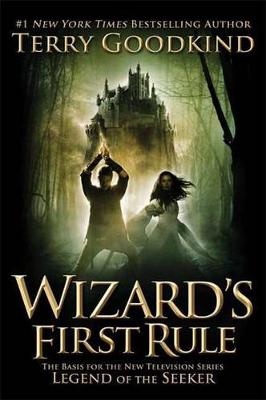Reviewed by ladygrey on
Book first: I liked it. It kept me interested even though I knew some of what was going to happen because of the show. The main characters were all well developed and interesting. It was a little long in some places where he dwelt on the landscape or tried to describe the setting, but that's also a necessary part of the telling to really evoke the story. I just feel like I don't always comprehend that stuff well enough and at the same time know that I get enough of it to set a tone for what's happening.
I was surprised at how dark it gets. It's almost a very dark fairy in that bad things happen. Really bad things. He doesn't go into visceral detail with any of them, but he also doesn't hold back or skirt around anything. He doesn't pull any punches. But the fairy tale of it is that ultimately good triumphs. And not in a plastic-y false way a lot of people associate with any sort of happy ending. Good is supposed to win. Things are supposed to work out and people are supposed to be saved especially from the most dire moments.
Like the show, I like the complex ideas he deals with and gets all tangled up. Power and magic and love and their rules and repercussions make it an interesting story that doesn't fade with the last word. Though I almost stopped reading when the whole Mistress Denna story got started because it was really dark and really difficult and was so hard to read because of how much he loved Kahlan and how love itself was twisted within him, mingled with pain and being demeaned. It was awful. But, like all other things, in the end it wasn't so horrible. It somehow deepened him and strengthened him and made things more complex without destroying them.
Deviations: I didn't like that Darken Rahl was Richard's father. I like Panis as his father for two reasons: 1 - it provides a distance. Rahl as his father is uncomfortable because it's too close and too intimate. Brotherhood between them is much easier to navigate emotionally. 2 - It gives Panis an element of redemption. In this later days he actively did something good in siring Richard to stop Rahl and I like that because it awakes a sense of compassion for him.
I didn't like that Richard and Kahlan were able to be together in the end. Which is just ridiculous because in any other story it's the very thing I would want. But the first thing I thought was that that resolution removed any tension between them going forward. They no longer have to fight to be together. and I have never said anything like that ever before about any couple I wanted to be together, I just didn't expect it to happen so quickly. It felt too easy.
But on the other hand, I liked the parallel it created between Mistress Denna and Kahlan - that in order to survive one he had to hold himself back from her and to survive the other he had to give himself completely. If Richard and Kahlan hadn't found a way to be together in the end it would't have completed both sides of that magic in the same way. so it really worked, I just wasn't ready for it and it threw me.
I can see why they made a lot of the other changes between the book and the tv show (Denee's death and how Richard found out about Kahlan and the prophecy and the books of Orden and Counted Shadows and once those changes were made they necessitated successive changes). TV is a different creature than a book - tension must be evoked differently and sustained, there needs to be an immediacy to threats and an understandable reason for a lot of things. You have to make the audience understand visually and quickly instead of having the luxury of five pages of dialog to give exposition (and there were a lot of those moments in the book which I liked, but wouldn't make for an interesting show at all).
I did like the similarities between the book and show - they captured both Zed and Richard's dialog really well in the show and I know I was going backwards, but I thing the actors did a good job capturing these characters. Craig Horner was perhaps a bit too boyish compared to how Richard is written, but I think the producers intended that to give him room to grow and become the Seeker and to allow his doubts and questions to be even stronger than they were in the book. I think Craig balanced Richard's strength and conviction and his ease and humor. Bridget Regan did well with Kahlan's fierce strength and her compassion and the responsibility of being a Confessor. And Bruce Spence was fantastic at navigating Zedd's flippant humor with his deep power and knowledge.
Overall, I really liked it and am looking forward to reading [b:Stone of Tears|234184|Stone of Tears (Sword of Truth, #2)|Terry Goodkind|http://photo.goodreads.com/books/1311992409s/234184.jpg|3107985] to discover how it's different from season 2!
Reading updates
- Started reading
- 6 August, 2011: Finished reading
- 6 August, 2011: Reviewed
